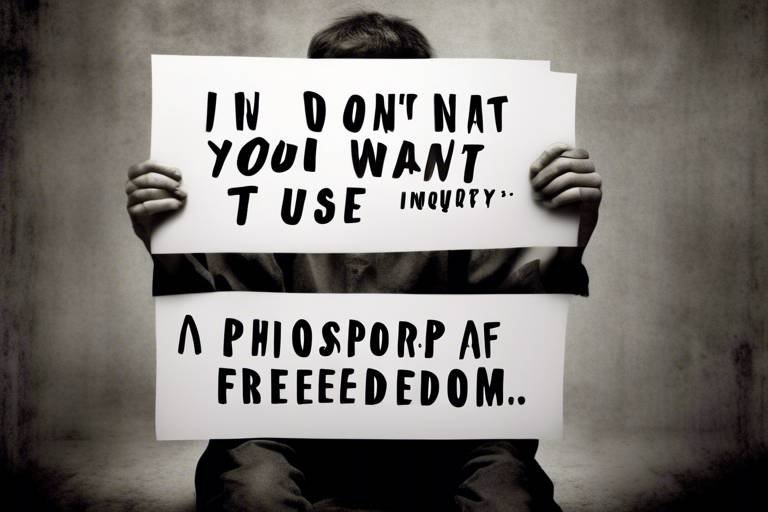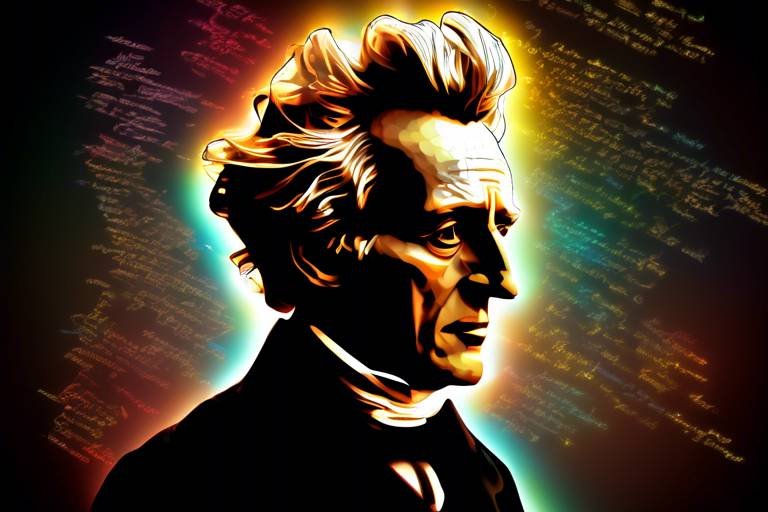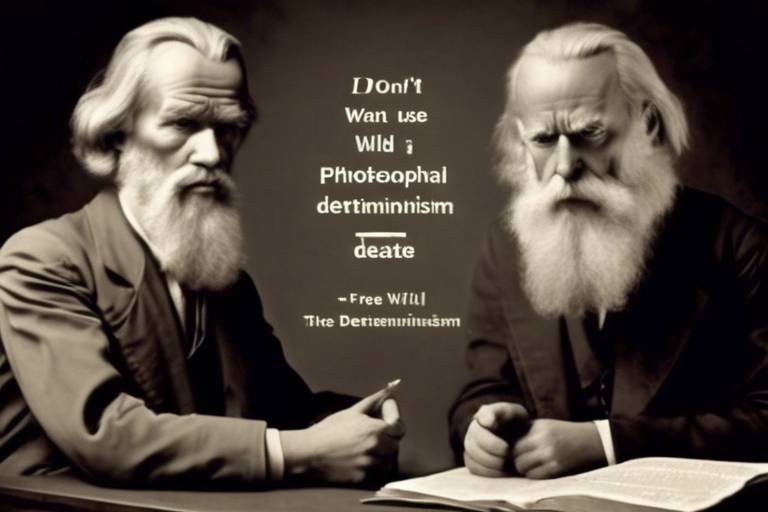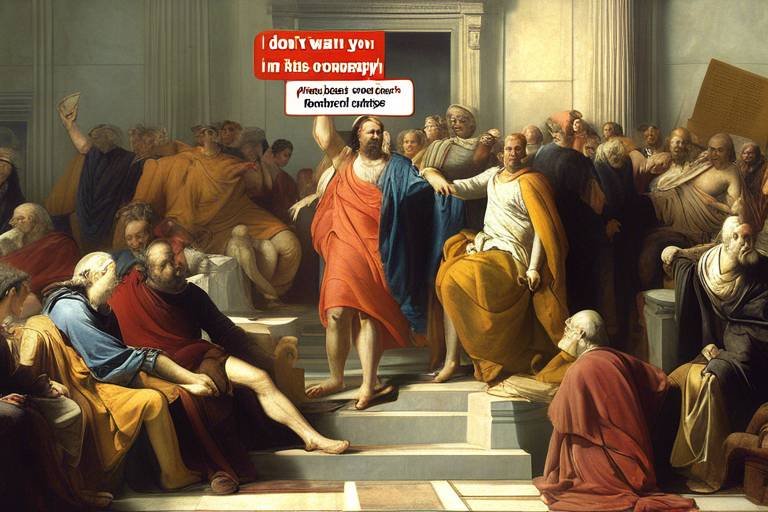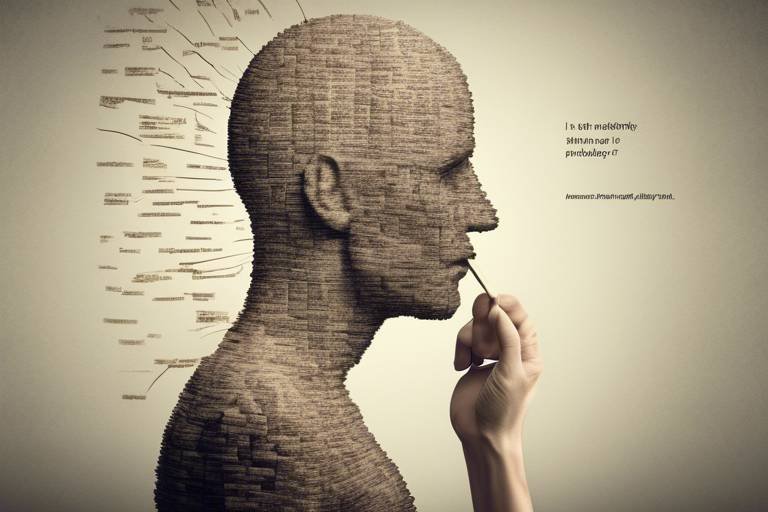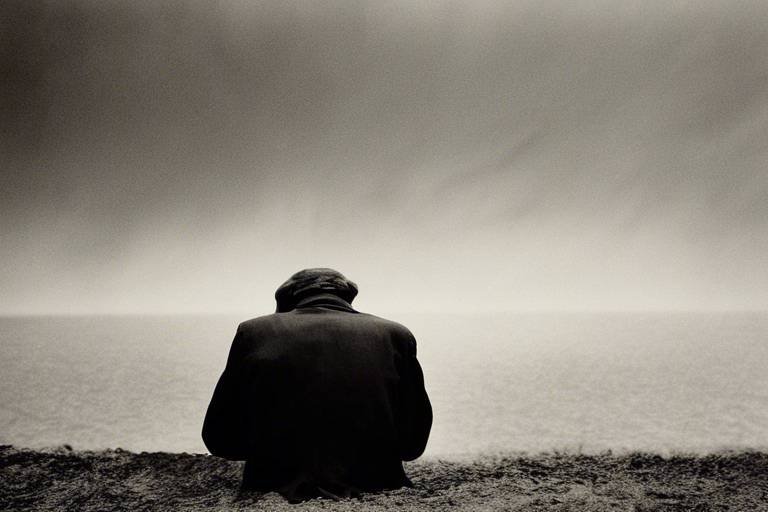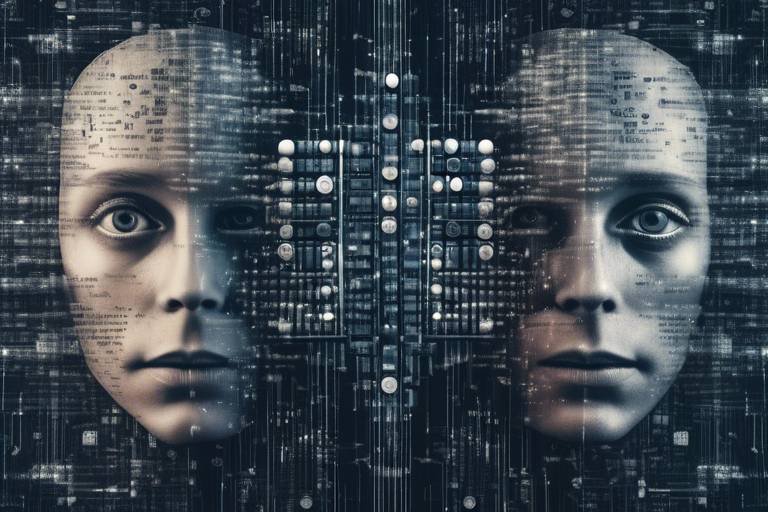The Concept of Freedom - A Philosophic Inquiry
Freedom, a term that evokes a myriad of emotions and thoughts, stands as one of the most cherished ideals in human history. From the ancient philosophers who pondered its essence to modern thinkers grappling with its implications, the concept of freedom has evolved, yet its core significance remains unchanged. At its heart, freedom represents the ability to act, think, and express oneself without undue restraint. It's not just a political slogan; it’s a profound philosophical inquiry that touches upon our very existence and identity.
In contemporary discourse, the multifaceted nature of freedom is often debated, with various interpretations emerging from diverse cultural and philosophical backgrounds. Some see freedom as an individual’s right to pursue happiness and self-fulfillment, while others view it as a collective responsibility to ensure that all members of society can enjoy similar liberties. This duality raises important questions: What does it truly mean to be free? Is freedom merely the absence of constraints, or does it require the presence of certain conditions that enable individuals to thrive?
Furthermore, the implications of freedom stretch beyond personal autonomy; they significantly impact societal well-being. A society that values freedom fosters creativity, innovation, and progress. However, the challenge lies in balancing individual freedoms with the collective good. This delicate equilibrium is often tested by various factors, including political regimes, social norms, and economic conditions. As we delve deeper into the philosophical underpinnings of freedom, it becomes evident that understanding its complexities is essential for navigating the challenges of modern life.
In this article, we will explore the historical perspectives on freedom, the different types it encompasses, and the philosophical theories that provide insights into its nature. We will also examine the contemporary challenges that threaten our freedoms and consider the future of liberty in an increasingly interconnected and digital world. Ultimately, this inquiry aims to illuminate the significance of freedom not just as a personal right, but as a cornerstone of human dignity and societal progress.
- What is the definition of freedom? Freedom generally refers to the state of being free, where individuals have the power to act, speak, or think without hindrance or restraint.
- How has the concept of freedom evolved over time? Throughout history, different cultures and philosophies have shaped our understanding of freedom, leading to various interpretations and applications in society.
- What are the different types of freedom? Freedom can be categorized into political, social, and personal freedom, each contributing to individual identity and societal structure.
- What challenges does freedom face today? Contemporary challenges include authoritarianism, censorship, and social inequality, all of which threaten individual liberties.
- How does digital technology impact freedom? Digital freedom addresses rights and liberties in online spaces, raising concerns about privacy, data security, and freedom of speech.

Historical Perspectives on Freedom
This article explores the multifaceted nature of freedom, its philosophical underpinnings, and its implications for individual and societal well-being, offering a comprehensive overview of its significance in contemporary discourse.
Examining the evolution of the concept of freedom throughout history reveals how different cultures and philosophies have shaped our understanding of liberty and autonomy over time. From the ancient civilizations of Greece and Rome to the Enlightenment thinkers of the 17th and 18th centuries, the notion of freedom has undergone significant transformations. In ancient Greece, freedom was often viewed through the lens of citizenship, where only a select group of individuals—namely, free men—enjoyed political rights. This exclusivity raises important questions about who is granted freedom and who is left out.
As we move through history, the Renaissance and the subsequent Age of Enlightenment brought about revolutionary ideas concerning individual rights and the social contract. Thinkers like John Locke and Jean-Jacques Rousseau argued that freedom was not merely a privilege but a fundamental human right. Their ideas laid the groundwork for modern democracy, emphasizing that a government should exist to protect the freedoms of its citizens rather than restrict them.
Moreover, the American and French Revolutions marked pivotal moments in the quest for freedom. The Declaration of Independence and the Declaration of the Rights of Man and of the Citizen articulated the belief that all individuals are entitled to liberty, equality, and fraternity. These documents not only inspired nations but also ignited discussions about the nature of freedom that continue to resonate today.
However, the journey toward freedom has not been linear. Various movements throughout history have challenged the status quo, advocating for the rights of marginalized groups. The abolition of slavery, women's suffrage, and the civil rights movement in the 20th century are just a few examples of how the definition of freedom has expanded to include social and economic dimensions. Today, freedom is often seen as a complex interplay of political, social, and personal rights, reflecting the diverse experiences of individuals across the globe.
To further illustrate the historical evolution of freedom, consider the following table that outlines key milestones:
| Year | Event | Significance |
|---|---|---|
| 1215 | Magna Carta | Established the principle that everyone, including the king, is subject to the law. |
| 1776 | Declaration of Independence | Asserted the right to life, liberty, and the pursuit of happiness. |
| 1789 | Declaration of the Rights of Man | Outlined individual and collective rights, influencing future democratic movements. |
| 1964 | Civil Rights Act | Prohibited discrimination based on race, color, religion, sex, or national origin. |
In conclusion, the historical perspectives on freedom reveal a rich tapestry of thought and struggle. Each era has contributed to the ongoing dialogue about what it means to be free, reminding us that freedom is not just a static condition but a dynamic process that requires constant vigilance and advocacy. As we navigate the complexities of modern society, understanding these historical contexts can empower us to appreciate and protect the freedoms we hold dear.
- What is the main idea behind the concept of freedom? Freedom encompasses the ability of individuals to act, speak, or think without hindrance or restraint, often linked to rights and liberties.
- How has the definition of freedom changed over time? The definition has evolved from a privilege for a select few to a universal right encompassing various social, political, and economic dimensions.
- What role do historical events play in shaping our understanding of freedom? Historical events highlight the struggles and achievements of various movements, influencing contemporary views on individual and collective liberties.

Types of Freedom
Freedom is a broad and intricate concept that can be dissected into various types, each playing a vital role in shaping both individual identities and societal structures. Understanding these different types of freedom is essential for grasping the full scope of what it means to be free in today’s world. At its core, freedom can be categorized into three primary types: political freedom, social freedom, and personal freedom. Each of these categories encompasses distinct aspects of liberty that influence how we interact with one another and with the systems that govern our lives.
Political freedom is perhaps the most discussed type of freedom, as it pertains to the rights of individuals within a state. This includes the ability to participate in democratic processes, express dissent, and enjoy civil liberties. Political freedom is crucial for maintaining a democratic society, where individuals can voice their opinions and influence government policies. It is not merely about the absence of oppression; rather, it involves active participation in the political sphere. For instance, the right to vote, freedom of speech, and the right to assemble are all integral components of political freedom.
Moving beyond the political realm, social freedom focuses on the relationships individuals can form and the communities they can engage with without undue constraints. This type of freedom underscores the importance of social norms and cultural influences in shaping our interactions. In many ways, social freedom is about the ability to live authentically, to form connections based on mutual respect and understanding. However, social constraints can sometimes inhibit this freedom, leading to a society where individuals feel pressured to conform to specific norms. For example, societal expectations regarding gender roles or cultural practices can limit an individual's ability to express themselves fully.
Finally, we have personal freedom, which pertains to the autonomy individuals have over their own lives. This includes the freedom to make choices regarding one’s lifestyle, beliefs, and personal relationships. Personal freedom is deeply tied to concepts of self-identity and self-expression. It allows individuals to pursue their passions, make decisions about their careers, and live according to their values. However, personal freedom can sometimes clash with societal expectations or legal restrictions, leading to debates about the extent of individual autonomy. For instance, discussions around reproductive rights or marriage equality often highlight the tension between personal freedom and societal norms.
| Type of Freedom | Description | Examples |
|---|---|---|
| Political Freedom | Rights related to participation in government and expression of dissent. | Voting, freedom of speech, right to assemble. |
| Social Freedom | Ability to engage in relationships and communities without undue constraints. | Forming friendships, cultural participation, lifestyle choices. |
| Personal Freedom | Autonomy over one’s own life choices and beliefs. | Career decisions, personal relationships, self-expression. |
In conclusion, the types of freedom—political, social, and personal—are interconnected and collectively shape our understanding of liberty. Each type influences how we experience life, interact with others, and engage with the world around us. As we navigate the complexities of modern society, recognizing these distinctions helps us appreciate the diverse ways in which freedom manifests and the ongoing struggles to protect and expand these liberties for all.
- What is the most important type of freedom? While all types of freedom are important, political freedom is often seen as foundational because it protects the rights necessary for social and personal freedoms to flourish.
- How can we protect our freedoms? Protecting freedoms requires active participation in democratic processes, awareness of social norms, and advocacy for personal rights.
- Are freedoms the same in every country? No, the interpretation and protection of freedoms vary widely across different cultures and political systems.

Political Freedom
is a cornerstone of any democratic society, embodying the principles of individual rights and collective governance. It is the ability of citizens to participate in the political process, express their opinions, and hold their government accountable. Imagine living in a world where your voice matters, where you can vote, protest, and engage in discussions without fear of reprisal. This is the essence of political freedom, and it is what differentiates a thriving democracy from an oppressive regime.
At the heart of political freedom lies the concept of individual rights, which are essential for maintaining a free society. These rights include the freedom of speech, the right to assemble, and the right to vote. Without these fundamental rights, citizens would be unable to express their views, advocate for change, or influence the direction of their government. Political freedom is not just about having the right to vote; it is about ensuring that every voice can be heard and that the government is accountable to the people.
Moreover, political freedom is intricately linked to the rule of law. A society governed by law ensures that no one, including those in power, is above the law. This legal framework protects citizens from arbitrary actions by the state, providing a safeguard against abuses of power. When laws are applied fairly and consistently, individuals feel secure in their rights, fostering a sense of trust in the political system.
However, the journey toward achieving political freedom is often fraught with challenges. In many parts of the world, authoritarian regimes suppress individual liberties in the name of stability or security. This suppression raises crucial questions: How do we balance the need for order with the necessity of freedom? Is it acceptable for governments to infringe upon individual rights for the sake of collective safety? These questions are not merely academic; they are at the forefront of political discourse today.
To illustrate the importance of political freedom, consider the following table that highlights key elements necessary for a free society:
| Element | Description |
|---|---|
| Freedom of Speech | The right to express one's opinions without censorship. |
| Right to Assemble | The ability to gather peacefully for protests or discussions. |
| Right to Vote | The opportunity for citizens to choose their representatives in government. |
| Judicial Independence | A system where the judiciary is separate from other branches of government. |
In conclusion, political freedom is not just a theoretical concept; it is a lived reality that shapes our societies. It empowers individuals to take part in the political process, ensuring that their voices are heard and their rights are protected. As we navigate the complexities of modern governance, it is crucial to remain vigilant in safeguarding these freedoms, recognizing that they are fundamental to our collective well-being.
- What is political freedom?
Political freedom refers to the rights and liberties individuals possess to participate in the political process, express opinions, and hold the government accountable. - Why is political freedom important?
It is essential for a healthy democracy as it ensures that citizens can influence governance, advocate for their rights, and express dissent without fear of repression. - How does the rule of law relate to political freedom?
The rule of law protects individual rights by ensuring that laws are applied fairly and that no one is above the law, including government officials. - What challenges does political freedom face today?
Challenges include authoritarianism, censorship, and the erosion of civil liberties, which threaten the ability of individuals to exercise their rights.

Democracy and Freedom
When we think about democracy, the first image that often comes to mind is one of people casting votes, engaging in debates, and participating in a system designed to represent their interests. But what lies beneath this surface is a complex relationship between democracy and freedom that is both fascinating and essential to understand. In a democratic society, freedom is not just a privilege; it is a fundamental right that empowers individuals to express their thoughts, participate in governance, and challenge the status quo. Yet, this relationship is not without its tensions.
At its core, democracy aims to safeguard individual liberties while ensuring that the collective needs of society are met. This balancing act can sometimes lead to conflicts, especially when the majority's will infringes upon the rights of minorities. For instance, consider the concept of majoritarianism, where the majority's preferences dictate policy decisions. This raises an important question: how do we protect the freedoms of those who may be outnumbered? This is where the importance of civil liberties comes into play, acting as a shield against potential tyranny of the majority.
Moreover, the role of institutions in a democracy cannot be overstated. They serve as the backbone that upholds freedoms through laws and regulations. For example, a strong judiciary can ensure that individual rights are protected, while a free press can hold those in power accountable. Without these institutions, democracy risks becoming a hollow shell, where the mere act of voting does not equate to true freedom.
Another interesting aspect to consider is the participatory nature of democracy. The more engaged individuals are in the democratic process, the more robust their freedoms become. This engagement can take many forms, such as:
- Voting in elections
- Joining advocacy groups
- Participating in public discussions
Each of these actions serves to strengthen the fabric of democracy, creating a society where individuals feel empowered to speak out and influence change. However, this empowerment can be undermined by factors such as censorship and disinformation, which can distort the public discourse and limit the scope of free expression. As such, a healthy democracy requires not only the presence of freedom but also the protection of that freedom through informed and engaged citizenry.
In conclusion, the relationship between democracy and freedom is intricate and dynamic. While democracy provides a framework for freedom, it also requires constant vigilance to ensure that all voices are heard and respected. As we navigate the complexities of modern governance, understanding this relationship becomes increasingly vital. After all, a truly democratic society is one where freedom is not just a concept but a lived reality for every individual.
- What is the relationship between democracy and freedom?
The relationship is complex; democracy aims to protect individual freedoms while balancing the needs of society. - How can individuals participate in democracy?
Individuals can participate by voting, joining advocacy groups, and engaging in public discussions. - What role do institutions play in protecting freedom?
Institutions like the judiciary and the press uphold freedoms by enforcing laws and holding power accountable.

Civil Liberties
are fundamental rights and freedoms that protect individuals from government overreach and ensure that citizens can participate fully in society without fear of repression. These liberties are often enshrined in law and serve as a safeguard against tyranny, allowing individuals to express themselves freely, assemble peacefully, and practice their religion without interference. In many democratic societies, civil liberties are viewed as non-negotiable rights that form the bedrock of a free and open society.
At the heart of civil liberties are several key principles that help define the relationship between the government and the individual. These principles include:
- Freedom of Speech: The right to express opinions and ideas without fear of censorship or punishment.
- Freedom of Assembly: The right to gather peacefully for demonstrations, protests, or other forms of collective expression.
- Freedom of Religion: The right to practice one's faith or beliefs without coercion or discrimination.
- Right to Privacy: The right to keep personal information and communications private from government surveillance.
These civil liberties are crucial for fostering an environment where individuals can engage in open discourse, challenge the status quo, and advocate for change. They empower citizens to hold their governments accountable and participate actively in the democratic process. However, the protection of these liberties often requires vigilance, as they can be threatened by various factors, including political agendas, social movements, and even cultural shifts.
For instance, during times of national crisis, such as war or terrorism, governments may impose restrictions on civil liberties in the name of security. This creates a delicate balance between maintaining safety and preserving individual freedoms. Citizens must remain aware of this dynamic and advocate for their rights, ensuring that any limitations on civil liberties are justified, temporary, and proportionate.
Moreover, the evolution of technology has introduced new challenges to civil liberties. With the rise of the internet and social media, issues surrounding digital privacy and freedom of expression have become increasingly complex. Governments and corporations often have access to vast amounts of personal data, raising concerns about surveillance and the potential for abuse. As society navigates these challenges, it is essential to engage in discussions about how to protect civil liberties in the digital age.
In conclusion, civil liberties are not just legal rights; they are the essence of what it means to be free. They empower individuals to express themselves, engage with others, and seek justice in a society that values autonomy and dignity. As we continue to grapple with the implications of modern governance and technology, the fight for civil liberties remains a critical aspect of preserving our freedoms and ensuring a just society for all.
- What are civil liberties? Civil liberties are rights and freedoms that protect individuals from government interference, ensuring personal autonomy and the ability to participate in society.
- Why are civil liberties important? They are essential for maintaining a free society, allowing individuals to express themselves, assemble, and practice their beliefs without fear of repression.
- How can civil liberties be threatened? They can be threatened by government overreach, societal pressures, and technological advancements that infringe on privacy and freedom of expression.
- What role does the government play in protecting civil liberties? The government is responsible for enshrining civil liberties in law and ensuring that citizens can exercise these rights without interference.
- How can individuals advocate for their civil liberties? Individuals can advocate for their rights by staying informed, participating in civic activities, and holding their government accountable for its actions.

Social Freedom
Social freedom is a vital aspect of human existence, encapsulating the ability of individuals to engage in relationships, communities, and various social interactions without undue constraints. Imagine walking through a vibrant market where people are freely exchanging ideas, laughter, and goods. This lively atmosphere is a testament to social freedom, where individuals can express themselves openly and connect with others without fear of judgment or repression. But what does social freedom really mean in today’s context?
To delve deeper, we must recognize that social freedom is not merely the absence of restrictions; it’s about the presence of opportunities for meaningful connections. It encompasses the right to participate in social activities, form relationships, and express one’s identity. This can include everything from joining community groups to participating in cultural events. However, the extent of social freedom can vary significantly based on cultural norms, societal structures, and even individual circumstances.
One of the key components of social freedom is the ability to engage with diverse groups of people. In an increasingly globalized world, individuals are exposed to a rich tapestry of cultures and ideas. This diversity can enhance social freedom by fostering understanding and collaboration. However, it can also lead to tensions, as differing values and beliefs may clash. Therefore, it’s essential to cultivate an environment where dialogue and respect thrive, allowing for a harmonious coexistence.
Moreover, social freedom is closely linked to the concept of social norms. These unwritten rules govern behavior within a community and can either facilitate or hinder social interactions. For instance, in some cultures, expressing personal opinions may be encouraged, while in others, it may be frowned upon. Understanding and navigating these norms is crucial for individuals seeking to exercise their social freedom effectively.
Additionally, the role of technology in shaping social freedom cannot be overlooked. The rise of social media platforms has revolutionized the way we connect with others. On one hand, these platforms provide a space for self-expression and community building; on the other hand, they can also lead to issues like cyberbullying and social isolation. Thus, while technology can enhance social freedom, it can also present challenges that need to be addressed.
In summary, social freedom is a multifaceted concept that plays a crucial role in shaping our identities and interactions within society. It is about more than just the absence of constraints; it is about creating an environment where individuals can thrive socially, culturally, and personally. As we navigate the complexities of modern life, it’s essential to champion social freedom, ensuring that everyone has the opportunity to engage and connect meaningfully.
- What is social freedom? Social freedom refers to the ability of individuals to engage in relationships and communities without undue constraints, allowing for self-expression and connection.
- Why is social freedom important? It fosters meaningful interactions, cultural exchange, and personal identity, contributing to overall societal well-being.
- How does technology impact social freedom? Technology can enhance social freedom by facilitating connections but can also pose challenges like cyberbullying and social isolation.
- What role do social norms play in social freedom? Social norms can either support or hinder social interactions, shaping how individuals express themselves within a community.

Philosophical Theories of Freedom
The concept of freedom is a rich tapestry woven with various philosophical threads, each offering a unique perspective on what it means to be free. From the existentialists to the libertarians, these theories not only challenge our understanding of freedom but also provoke deeper questions about human agency and the nature of choice. Existentialism, for instance, posits that freedom is not just a given; rather, it is an intrinsic part of human existence. This school of thought emphasizes that individuals are responsible for creating their own meaning in a world that can often feel chaotic and absurd. Imagine standing at a crossroads, with every choice you make shaping your identity and future—this is the essence of existentialist freedom.
On the other hand, libertarianism presents a more structured view, advocating for minimal state intervention in personal lives. This philosophy argues that true freedom is realized through individual autonomy and the protection of private property rights. In this view, the role of government should be limited, ensuring that individuals have the maximum freedom to pursue their own interests without interference. Picture a vast open field where everyone can run freely, but only if the fences of government are kept low and manageable.
In contrast, the philosophy of determinism raises a critical question: Are we truly free if our actions are predetermined by external factors like biology, environment, and social conditioning? Determinists argue that while we may feel free, our choices are often influenced by forces beyond our control. This perspective can feel like a heavy weight, as if we are marionettes dancing on strings we cannot see. It's a sobering thought that challenges the very foundation of our understanding of freedom.
These philosophical theories not only enrich our understanding of freedom but also highlight the complexities involved in its pursuit. For example, one might ponder: If freedom is inherent to human existence, how do we reconcile this with the societal structures that often impose limitations? Moreover, the implications of these theories extend beyond individual contemplation; they shape political ideologies and influence governance worldwide.
As we navigate the modern world, understanding these philosophical perspectives becomes increasingly vital. They encourage us to reflect on our values and the societal frameworks we inhabit. Are we fostering an environment that promotes true freedom, or are we, perhaps unknowingly, erecting barriers that limit it? The answers to these questions can guide us in advocating for a society that values both individual rights and collective well-being.
- What is the main idea of existentialism regarding freedom? Existentialism suggests that freedom is inherent to human existence, emphasizing personal responsibility in creating meaning and making choices.
- How does libertarianism define freedom? Libertarianism advocates for minimal government intervention, arguing that true freedom is achieved through individual autonomy and the protection of private property rights.
- What is determinism's view on freedom? Determinism posits that our choices may be influenced by external factors, questioning whether we are truly free in our decision-making.

Existentialism
Existentialism is a philosophical movement that emerged in the 20th century, fundamentally concerned with the nature of human existence, freedom, and the search for meaning in a seemingly indifferent universe. At its core, existentialism posits that individuals are not merely products of their circumstances or societal norms; rather, they are endowed with the freedom to make choices and shape their own destinies. This perspective is both liberating and daunting, as it places the onus of meaning-making squarely on the individual.
One of the key figures in existentialist thought, Jean-Paul Sartre, famously proclaimed that “existence precedes essence,” suggesting that humans first exist and then define their essence through actions and choices. This idea challenges the notion that we are born with a predetermined purpose. Instead, it invites us to embrace our freedom, albeit with the weighty responsibility that accompanies it. The existentialist perspective encourages a deep exploration of one’s desires, fears, and motivations, leading to a more authentic existence.
Existentialism also grapples with the concept of absurdity, a term popularized by Albert Camus. The absurd arises from the clash between our quest for meaning and the chaotic, indifferent nature of the universe. Camus argued that rather than succumbing to despair, individuals should embrace the absurd condition of life, finding joy and freedom in the very act of living. This perspective can be likened to a tightrope walk, where one must navigate the tension between seeking significance and acknowledging life’s inherent randomness.
Moreover, existentialism emphasizes the importance of individual experience and perspective. It invites us to reflect on our choices and their consequences, fostering a sense of personal accountability. By acknowledging our freedom, we also confront the reality of isolation; the existentialist view often highlights the loneliness that comes from realizing that others may not share our understanding or values. This isolation can be unsettling, yet it also cultivates a profound sense of individuality.
In practical terms, existentialism encourages individuals to:
- Engage in self-reflection to understand their values and beliefs.
- Take responsibility for their choices and actions.
- Embrace the uncertainty of life and the freedom it entails.
- Seek authentic relationships based on mutual understanding and respect.
Ultimately, existentialism serves as a powerful reminder that while life may be devoid of inherent meaning, the freedom to create our own meaning is a gift. It challenges us to confront our existence head-on, urging us to live fully and authentically in a world that often feels chaotic and absurd.
- What is the main idea of existentialism?
Existentialism focuses on individual freedom, choice, and the search for meaning in a seemingly indifferent universe. - Who are the key philosophers associated with existentialism?
Prominent figures include Jean-Paul Sartre, Albert Camus, and Simone de Beauvoir, each contributing unique perspectives to existential thought. - How does existentialism view freedom?
Existentialism views freedom as a fundamental aspect of human existence, emphasizing the responsibility that comes with the ability to make choices. - What does it mean to embrace the absurd?
Embracing the absurd means recognizing the conflict between our desire for meaning and the chaotic nature of life, and finding joy in the act of living itself.

Libertarianism
Libertarianism is a political philosophy that champions the idea of individual freedom and autonomy as its core principles. At its heart, this ideology argues that individuals should have the liberty to make choices about their own lives without interference from the government or any other authority. Imagine a world where your choices are yours alone, where the government’s role is minimized, and where personal responsibility reigns supreme. This is the essence of libertarian thought.
The roots of libertarianism can be traced back to classical liberalism, which emphasizes the protection of individual rights and freedoms. Libertarians believe that the best way to achieve a just society is to limit the powers of the state. They argue that when governments expand their reach, they often encroach upon personal freedoms, leading to a society where individual rights are compromised. This perspective can be summed up in a few key tenets:
- Individual Autonomy: Every person should have the right to govern themselves, making decisions about their own lives.
- Private Property Rights: Ownership of property is fundamental to personal freedom, and the state should not interfere with an individual's right to acquire and use their property.
- Minimal State Intervention: The government’s role should be limited to protecting individual rights and maintaining order, rather than controlling or regulating personal choices.
Libertarians contend that true freedom is only achievable when individuals are free to pursue their own interests, whether that be in business, personal relationships, or lifestyle choices. This philosophy often leads to debates about the role of government in economic matters, social issues, and personal conduct. For instance, libertarians typically advocate for free markets, arguing that economic freedom fosters innovation and prosperity. They believe that when individuals are free to engage in voluntary exchanges, the overall welfare of society improves.
However, libertarianism is not without its criticisms. Detractors often point out that extreme individualism can lead to social inequality and a lack of support for those who are less fortunate. They argue that a completely laissez-faire system might neglect the needs of vulnerable populations, raising questions about the balance between freedom and social responsibility. This tension between individual liberty and collective well-being is a central theme in discussions about libertarianism.
In today’s world, the principles of libertarianism resonate with many who are concerned about government overreach and the erosion of civil liberties. The rise of digital technologies, surveillance, and data privacy issues has prompted renewed interest in libertarian ideas, as individuals seek to reclaim their rights in an increasingly interconnected and monitored society. As we navigate these complex challenges, libertarianism offers a compelling framework for understanding the importance of freedom and the potential consequences of relinquishing it.
1. What is the main idea behind libertarianism?
Libertarianism advocates for individual freedom and minimal government intervention in personal and economic matters, emphasizing that individuals should have the autonomy to make their own choices.
2. How does libertarianism view government?
Libertarians typically view government as a necessary evil that should be limited in scope, primarily tasked with protecting individual rights and maintaining order, rather than regulating personal conduct.
3. What are some common criticisms of libertarianism?
Critics argue that libertarianism can lead to social inequality and neglect the needs of vulnerable populations due to its strong emphasis on individualism and minimal state intervention.
4. How does libertarianism relate to current issues like privacy and surveillance?
With the rise of digital technologies and concerns over surveillance, libertarianism has gained traction as it emphasizes the importance of personal privacy and freedom from government intrusion in individuals' lives.

Challenges to Freedom
In today’s fast-paced world, the concept of freedom faces a myriad of challenges that can often feel overwhelming. As we navigate through the complexities of modern society, it becomes essential to recognize and address the threats that undermine our liberties. Among these challenges, authoritarianism, censorship, and social inequality stand out as significant barriers to the realization of true freedom for individuals and communities alike.
Authoritarianism, in particular, poses a profound threat to individual freedoms. In many parts of the world, governments prioritize control and order over personal liberties, often justifying their actions in the name of security. This raises pressing questions about the delicate balance between safety and liberty. When does the pursuit of security infringe upon our fundamental rights? The answer is not always clear, but the impact is undeniable. Citizens in authoritarian regimes often find themselves in a constant struggle to reclaim their rights, facing oppression and repression at every turn.
Censorship is another significant challenge that directly undermines freedom of expression. In an age where information flows freely across borders, the act of silencing dissenting voices can have dire consequences. Whether through state-sponsored media control or social media platforms enforcing strict guidelines, censorship limits access to information and stifles the very essence of a democratic society. It is vital for individuals to have the ability to express their thoughts and opinions without fear of reprisal. When censorship prevails, the marketplace of ideas shrinks, leading to a homogenized narrative that can be dangerous for societal progress.
Moreover, social inequality further complicates the landscape of freedom. Economic disparities create barriers that prevent individuals from exercising their rights fully. Those in marginalized communities often face systemic obstacles that limit their access to education, healthcare, and opportunities for advancement. This inequality can manifest in various ways, such as:
- Lack of representation in political processes
- Discrimination based on race, gender, or socioeconomic status
- Limited access to resources that enable personal and professional growth
As these challenges continue to evolve, it is crucial for society to engage in critical reflection and proactive measures to safeguard our liberties. Advocacy, education, and open dialogue are essential tools in the fight against authoritarianism, censorship, and social inequality. By fostering a culture that values freedom and encourages diverse perspectives, we can work towards a future where individual rights are respected and protected.
What is authoritarianism?
Authoritarianism is a political system characterized by the concentration of power in a leader or an elite not constitutionally responsible to the public. It often involves the suppression of political dissent and individual freedoms.
How does censorship affect freedom of expression?
Censorship limits access to information and the ability to express dissenting opinions, which are fundamental components of a democratic society. It can lead to a lack of accountability and transparency in governance.
What role does social inequality play in freedom?
Social inequality creates barriers that hinder individuals from fully exercising their rights. Economic disparities can lead to limited access to opportunities, education, and representation, thereby constraining personal freedoms.

Authoritarianism
Authoritarianism poses a significant challenge to the concept of freedom, as it often prioritizes state control over individual liberties. In such regimes, the government exerts substantial power over various aspects of life, including politics, media, and personal expression. This suppression of freedom raises critical questions about the balance between safety and liberty. Are we willing to sacrifice our freedoms for the illusion of security? History has shown us that authoritarian regimes often emerge during times of crisis, exploiting fear to justify their actions.
In an authoritarian system, dissent is typically stifled through various means, including:
- Intimidation: The state may use police forces or military power to intimidate those who oppose its policies.
- Censorship: Control over the media and information flow limits public access to diverse viewpoints, creating an echo chamber that reinforces state narratives.
- Propaganda: Governments often disseminate propaganda to manipulate public opinion and maintain control over the populace.
This suppression of dissent can lead to a culture of fear, where individuals are reluctant to express their opinions or challenge the status quo. Over time, this erosion of freedom can have profound implications for society, including:
| Implications of Authoritarianism | Effects on Society |
|---|---|
| Loss of Civil Liberties | Individuals may find themselves unable to speak freely, assemble peacefully, or practice their beliefs without fear of retribution. |
| Decreased Trust in Institutions | When the government is perceived as oppressive, public trust in institutions can erode, leading to societal fragmentation. |
| Stifled Innovation | A lack of freedom can hinder creativity and innovation, as individuals may hesitate to explore new ideas or challenge existing norms. |
Ultimately, the rise of authoritarianism serves as a stark reminder of the fragility of freedom. It compels us to reflect on the importance of safeguarding our liberties and the necessity of active participation in democratic processes. As citizens, we must remain vigilant against encroachments on our freedoms, recognizing that the fight for liberty is a continuous journey, not a destination. In a world where authoritarianism threatens to overshadow individual rights, the question remains: How can we collectively resist the tide of oppression and ensure that freedom remains a fundamental aspect of our societies?
- What is authoritarianism? Authoritarianism is a political system characterized by strong central power and limited political freedoms, often suppressing dissent and controlling many aspects of life.
- How does authoritarianism affect individual freedoms? It restricts civil liberties, such as freedom of speech, assembly, and press, leading to a culture of fear and repression.
- Can authoritarianism emerge in democratic societies? Yes, authoritarianism can emerge in democratic societies, especially during crises when governments may exploit fear to gain power.
- What can individuals do to combat authoritarianism? Individuals can advocate for their rights, participate in democratic processes, and support organizations that promote freedom and human rights.

Censorship
Censorship is a powerful tool wielded by governments, organizations, and even individuals to control the flow of information and suppress dissent. At its core, censorship seeks to limit access to ideas, opinions, and expressions that may challenge the status quo or threaten those in power. This practice can take many forms, from outright bans on certain publications to more subtle methods like manipulating media narratives. The implications of censorship are profound, as it not only stifles freedom of expression but also undermines the very foundation of a democratic society.
The rationale behind censorship often revolves around the notion of protecting societal values or maintaining national security. However, the line between protection and oppression can be alarmingly thin. For instance, in many authoritarian regimes, censorship is justified under the guise of national interest, leading to widespread suppression of dissenting voices. This raises critical questions: How far can a government go in the name of security before it infringes on individual liberties? And at what point does censorship become a tool of oppression rather than a means of safeguarding the public?
Moreover, censorship has evolved with technology. In the digital age, the internet has become a double-edged sword. On one hand, it offers unprecedented access to information; on the other, it has given rise to new forms of censorship. Governments can now monitor online activities, block websites, and even manipulate social media platforms to control public discourse. This situation creates a paradox where the very tools designed to enhance freedom can also be used to curtail it.
To illustrate the impact of censorship, consider the following table that outlines some common forms of censorship and their effects:
| Type of Censorship | Description | Potential Effects |
|---|---|---|
| Government Censorship | State-imposed restrictions on media and speech. | Suppression of dissent, limited public discourse. |
| Self-Censorship | Individuals or organizations refrain from expressing certain views. | Stifling of creativity, fear of repercussions. |
| Corporate Censorship | Businesses controlling content for profit or public image. | Loss of diverse viewpoints, biased information. |
| Internet Censorship | Blocking or filtering online content by governments or ISPs. | Restricted access to information, limited freedom of speech. |
Ultimately, censorship poses a significant challenge to the concept of freedom. It not only limits individual rights but also deprives society of the rich tapestry of ideas that drive progress and innovation. When voices are silenced, the potential for growth and understanding diminishes, leading to a stagnant culture that fears change. As we navigate the complexities of modern governance and technology, it is crucial to remain vigilant against the encroachment of censorship in any form. After all, a society that values freedom must also cherish the right to speak, listen, and engage in open dialogue.
- What is censorship? Censorship is the suppression or prohibition of speech, public communication, or other information that may be considered objectionable or harmful by authorities.
- How does censorship affect freedom of speech? Censorship directly undermines freedom of speech by limiting individuals' ability to express their thoughts and opinions freely, which is essential for a healthy democracy.
- Are there different types of censorship? Yes, censorship can take various forms, including government censorship, self-censorship, corporate censorship, and internet censorship.
- What are the consequences of censorship? Censorship can lead to a lack of diverse viewpoints, stifled creativity, and a culture of fear where individuals are hesitant to speak out against prevailing norms.
- How can we combat censorship? Combating censorship involves advocating for free speech, supporting independent media, and using technology to promote transparency and access to information.

The Future of Freedom
The future of freedom is an ever-evolving landscape, shaped by rapid technological advancements and global challenges. As we navigate through the complexities of modern life, the definition of freedom is continuously being reexamined. One of the most pressing issues we face today is how technology influences our liberties. With the rise of digital platforms, individuals are granted unprecedented access to information and communication, but this comes with a caveat. The same technology that empowers us can also infringe on our rights. For instance, surveillance technologies can monitor our activities in ways that were unimaginable just a few decades ago.
Moreover, the concept of digital freedom has emerged as a critical area of focus. Digital freedom pertains to the rights individuals have in online spaces, including privacy, data security, and freedom of speech. As more of our lives shift online, the implications of these rights become increasingly significant. Imagine a world where your every online move is tracked and analyzed. This scenario raises vital questions: How much privacy are we willing to sacrifice for convenience? What measures can we take to protect our personal information? The answers to these questions will shape the future of our liberties.
It's also essential to consider global perspectives on freedom. Different cultures and nations interpret freedom in varied ways, reflecting diverse values and priorities. For instance, in some countries, freedom of speech is celebrated as a fundamental right, while in others, it is heavily restricted. This divergence can lead to conflicts, but it can also foster collaboration. As the world becomes more interconnected, understanding these differing perspectives is crucial for promoting a global dialogue about freedom.
To illustrate the varying interpretations of freedom across different nations, consider the following table:
| Country | Interpretation of Freedom |
|---|---|
| United States | Emphasis on individual rights and freedom of speech |
| China | Focus on collective security over individual liberties |
| Sweden | Strong social welfare system supporting individual freedom |
| Iran | Restricted freedoms with emphasis on religious laws |
As we look to the future, it is crucial to engage in discussions about how to safeguard our freedoms in an increasingly complex world. We must remain vigilant against threats such as authoritarianism, which can arise in various forms, and censorship, which can stifle the very essence of democracy. The challenge is to find a balance between embracing technological advancements and protecting our fundamental rights.
In conclusion, the future of freedom is not predetermined; it is shaped by our actions, choices, and the ongoing dialogue about what it means to be free in a rapidly changing world. As we confront new challenges, let us remember that freedom is not merely a privilege, but a responsibility we all share. Together, we can navigate this intricate landscape and ensure that the essence of liberty endures for generations to come.
- What is digital freedom? Digital freedom refers to the rights individuals possess in online spaces, including privacy and freedom of expression.
- How does technology impact our freedoms? While technology can enhance access to information, it can also lead to increased surveillance and data privacy concerns.
- Why are global perspectives on freedom important? Understanding different interpretations of freedom can foster collaboration and dialogue in an increasingly interconnected world.

Digital Freedom
In today's hyper-connected world, the concept of has emerged as a pivotal aspect of our overall liberty. As we navigate through an increasingly digital landscape, our rights and freedoms online have become just as important as those we cherish in the physical realm. But what does it really mean to have digital freedom? Is it merely the absence of restrictions, or does it encompass a broader spectrum of rights that protect our online identities and interactions?
Digital freedom refers to the rights and liberties that individuals possess in online spaces, which includes the ability to communicate, access information, and express oneself without undue interference. This notion is crucial as it touches on several key areas:
- Privacy: In an age where data is often viewed as the new oil, the right to privacy online is paramount. Individuals should have control over their personal information and how it is shared.
- Freedom of Speech: The internet has given a voice to the voiceless, allowing individuals to express their opinions freely. However, this freedom is often challenged by various forms of censorship.
- Data Security: As we share more of our lives online, ensuring the security of our data from breaches and unauthorized access is essential for maintaining digital freedom.
However, digital freedom is not without its challenges. The rise of surveillance technologies and the increasing power of tech giants pose significant threats to our liberties. Governments and corporations alike have the capability to monitor our online activities, raising important questions about the balance between security and privacy. For instance, how much are we willing to sacrifice our personal freedoms for the sake of safety?
Moreover, the concept of digital freedom varies significantly across different cultures and governments. Some nations embrace an open internet where individuals can freely express their thoughts, while others impose strict regulations that stifle dissent and control information flow. This disparity often leads to conflicts and discussions about the universal nature of human rights in the digital age.
As we look to the future, it is essential to advocate for a framework that protects digital freedom while addressing the complexities of modern technology. This involves fostering a culture of digital literacy, where individuals are educated about their rights online and the implications of their digital footprints. Only then can we ensure that freedom in the digital realm is not just an ideal, but a reality for all.
- What is digital freedom? Digital freedom refers to the rights individuals have to access information, communicate, and express themselves freely in online spaces.
- Why is digital freedom important? It is crucial for protecting individual privacy, ensuring freedom of speech, and securing personal data in an increasingly digital world.
- What are the threats to digital freedom? Major threats include government surveillance, corporate data breaches, and censorship that limits free expression.
- How can individuals protect their digital freedom? By being informed about their rights, using secure communication tools, and advocating for policies that promote privacy and freedom of expression.

Global Perspectives on Freedom
When we talk about freedom, it's essential to recognize that its interpretation can vary dramatically across different cultures and nations. What one society sees as a fundamental right, another may view as a privilege or even a threat. This divergence can lead to both conflict and collaboration in our increasingly interconnected world. For instance, in Western democracies, freedom is often associated with individual rights and the ability to express oneself without fear of retribution. However, in some collectivist societies, freedom might be framed more around communal well-being and the responsibilities that come with it.
To illustrate this further, consider the following table that highlights different cultural attitudes towards freedom:
| Region | View on Freedom | Key Influences |
|---|---|---|
| North America | Individual rights and personal liberty | Democratic values, capitalism |
| Europe | Balancing individual freedom with social responsibility | Social democracy, historical context |
| Asia | Community and family over individualism | Confucian values, collectivism |
| Africa | Freedom intertwined with cultural identity and community | Traditional customs, colonial history |
| Middle East | Freedom often viewed through a religious and cultural lens | Religious doctrines, tribal affiliations |
This table demonstrates that freedom is not a one-size-fits-all concept. For example, while many in North America champion the right to free speech as a cornerstone of democracy, others in Asia may prioritize social harmony over individual expression. This leads to a fascinating dialogue about what freedom truly means and how it should be protected or restricted.
Moreover, the rise of globalization has brought these differing views into sharper focus. As countries interact more than ever, the clash of ideas about freedom can lead to both enriching exchanges and significant tensions. For instance, international organizations often advocate for universal human rights, but the reception of these ideas can vary widely. In some regions, calls for greater freedom can be seen as imperialistic interference, while in others, they are welcomed as a necessary evolution of society.
Ultimately, understanding global perspectives on freedom requires us to look beyond our own experiences and consider the complex tapestry of beliefs and values that shape how different cultures interpret liberty. We must ask ourselves: how do we reconcile these differences in a world that is becoming increasingly interdependent? And how can we foster a dialogue that respects diverse views while advocating for fundamental human rights?
- What is the definition of freedom?
Freedom generally refers to the power or right to act, speak, or think as one wants without hindrance or restraint. - Why do different cultures view freedom differently?
Cultural, historical, and social contexts greatly influence how freedom is understood and valued. - Can freedom coexist with social responsibility?
Yes, many societies strive to balance individual freedoms with the needs and well-being of the community. - How does globalization affect our understanding of freedom?
Globalization brings diverse perspectives on freedom into dialogue, which can lead to both collaboration and conflict.
Frequently Asked Questions
- What is the definition of freedom?
Freedom is often defined as the power or right to act, speak, or think as one wants without hindrance or restraint. It encompasses various dimensions, including political, social, and personal liberties, allowing individuals to pursue their own paths and make choices that shape their lives.
- How has the concept of freedom evolved over time?
The concept of freedom has evolved significantly throughout history, influenced by various cultures, philosophies, and social movements. From ancient civilizations that emphasized collective rights to modern democracies that focus on individual liberties, the understanding of freedom continues to adapt to changing societal contexts.
- What are the different types of freedom?
Freedom can be categorized into several types, including:
- Political Freedom: Relates to the rights individuals have within a state, such as voting and free speech.
- Social Freedom: Involves the ability to engage in relationships and communities without undue restrictions.
- Personal Freedom: Pertains to the autonomy individuals have over their own lives and choices.
- What role does democracy play in freedom?
Democracy plays a crucial role in promoting freedom by ensuring that individual rights are protected while balancing the needs of the collective. It provides a framework for citizens to participate in governance, express their opinions, and hold authorities accountable, thus fostering an environment where freedom can thrive.
- What are civil liberties?
Civil liberties are fundamental rights that protect individuals from governmental overreach. These include the right to free speech, freedom of assembly, and the right to privacy. They are essential for maintaining a free society, allowing citizens to express themselves and participate in public life without fear of repression.
- What challenges does freedom face today?
Contemporary society faces numerous challenges to freedom, including:
- Authoritarianism: Regimes that suppress individual liberties in the name of security.
- Censorship: Restrictions on freedom of expression that limit access to information and stifle dissent.
- Social Inequality: Disparities that hinder equal access to freedoms for all individuals.
- What is digital freedom?
Digital freedom refers to the rights and liberties individuals possess in online spaces. It encompasses issues related to privacy, data security, and freedom of speech in the digital realm, highlighting the importance of safeguarding personal information and ensuring open access to information in an increasingly connected world.
- How do different cultures interpret freedom?
Different cultures and nations interpret freedom in varied ways, reflecting their unique values and priorities. These interpretations can lead to both conflict and collaboration in an interconnected world, as diverse perspectives on freedom shape international relations and global discourse.

